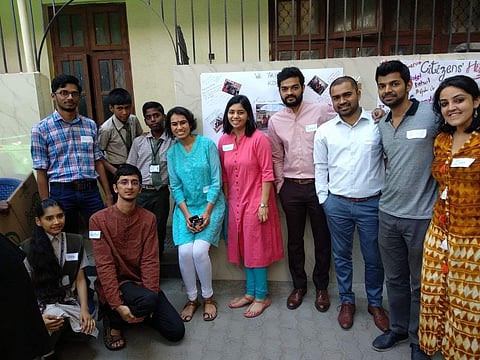

Last year, Rahul from Citizens' High School in Bengaluru built a water wastage detection device that can actually alert you when the water tank in your house overflows. A loud siren goes off as soon as the tank is filled with water so that you can quickly close the tap before there is wastage. Whenever the water tank overflowed in Rahul’s house, it would go unnoticed for a considerable amount of time, leading to heavy wastage of the precious natural resource. As necessity is the mother of invention, he built this innovative device to avoid wastage of water. The eighth-grader says, "KidsWhoKode came to our school to teach coding in various languages and I found it very interesting. This led me to code a programme for the device that I built." Rahul presented his device in front of several delegates and one of them even funded the manufacturing of the device. Today, he makes the device at home and sells it for Rs 90 a piece.
Just like Rahul, there are many kids who have developed their own coding programmes and built several such devices to benefit society. And this has been possible only through the efforts of Shweta Mukesh and her team at KidsWhoKode. In 2011, she moved from the USA to India and wanted to contribute to the education system here. After working with several NGOs, she noticed that there was no collaboration in their work. Coming from a Science and Technology background, she also noticed that instead of helping children plunge into the world of computers and technology, they were hardly taught anything beyond Math and English. That's when she stepped in to help children learn coding through her programme, KidsWhoKode.
In a span of two years, KidsWhoKode has trained over 35,000 kids in coding and various languages that are used to develop video games, quizzes, websites, mobile applications, calculators, calendars and so on. Before they could execute their programme, Shweta and her team experimented for six months to see what would work and what wouldn't. Explaining the four different programmes that they have designed for students of classes VII to IX, she says, "The foundation for coding is to learn how to operate and navigate computers. So, we start with basic lessons on computers, its functions and applications like Microsoft Word, Excel, PowerPoint and so on. Gradually, teachers ensure that subject tests are conducted on Google Docs or Microsoft Word to help kids. Bootcamps is another programme that we conduct for three to four months. Here, students are taught topics like back-end and front-end development. It is during this phase that students learn to code and build their own projects including websites, mobile games and applications. Apart from all this, students get to attend guest lectures by experts in the field. For example, last time, students got to interact with someone who worked directly with Microsoft Corporations’ Co-founder Bill Gates. Youngsters working in different corporates also take part in these lectures. It's a win-win situation for both. While the kids gain knowledge on various subjects, the confidence of those people who chose to talk increases. And then comes the last programme - what we call continuous learning. After the kids have participated in our bootcamps, they can access our website and learn from the videos and topics available on it. They can also ask questions or seek help with clearing their doubts."
What sets them apart?
What makes it interesting is that KidsWhoKode is a zero-funds organisation. Yes, they neither raise funds nor do they charge anything for teaching. This is all because of the money, time and knowledge invested by Shweta and her team. Another positive aspect of their team is that anyone who is interested can volunteer to teach. Shweta says, "We provide them with a script of what has to be taught, the kind of stories one has to narrate in the class and so on. We are very transparent as anyone can walk into the class and track the data from students and teachers. And the last point is collaboration. We collaborate with the corporates, NGOs and institutions who want to teach technology to kids. In fact, we work as domain experts to train people from organisations who don't have knowledge of what has to be taught when it comes to computers."
They've got plans on their list
In the coming days, their biggest focus area will be on adding new features to their platform. Shweta thinks that not much has been done when it comes to peer-to-peer learning and gamified learning. She says, "We would like to explore more on this front and incorporate these two features in our platform. This will also keep kids interested in technology after learning to code and improve their skills. Apart from this, we want to keep our operations stable."
Here are some of the projects done by Shweta's students:
Automated Report Card: Students of Citizens' High School developed an automated report card programme where one can enter the marks of subjects from Semester 1 and Semester 2, and the report card generates the automated percentage and total marks
School Quiz: This contains several questions related to Math. It is a fun quiz that can help children work on their calculations
Rolls Royce Website: Some of her students who are interested in automobiles have created a website that can explain everything about a Rolls Royce
Space Website: Using the information available on Wikipedia and their own research, students have developed a space-related website. It includes information on the solar system, stars, human beings in space and India's role in space science
